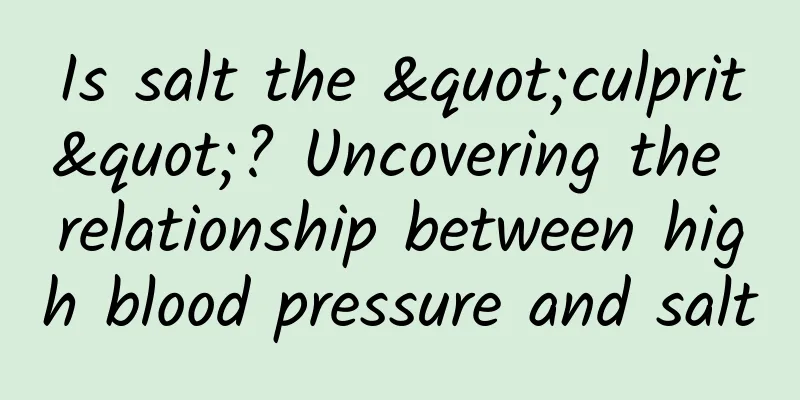Is salt the "culprit"? Uncovering the relationship between high blood pressure and salt

|
Salt is one of the essential condiments in our daily diet, but there is a close relationship between excessive salt intake and high blood pressure. Today, let’s discuss the relationship between salt and high blood pressure. It’s hard to say enough about salt! The relationship between high blood pressure and salt First, we need to understand the definition of hypertension. Hypertension, also known as hypertension, is a chronic disease in which arterial blood pressure continues to rise. Long-term high blood pressure can damage organs such as the heart and blood vessels, and increase the risk of cardiovascular and cerebrovascular diseases. Salt, or the sodium contained in table salt, is one of the main causes of high blood pressure. Sodium ions play an important role in maintaining blood volume and blood pressure stability in the body, but when the intake of sodium ions exceeds the body's needs, it will lead to an increase in blood volume, which in turn increases blood pressure. According to the recommendations of the World Health Organization, the daily sodium intake of adults should be controlled below 5 grams, while China's dietary guidelines recommend that healthy adults should not consume more than 6 grams of sodium per day. So why do we need to control our salt intake? The dangers of high-salt foods First, a high-salt diet increases the risk of high blood pressure. Studies have found that sodium intake is positively correlated with blood pressure levels, that is, the higher the sodium intake, the higher the blood pressure. Data shows that the prevalence of hypertension among Chinese adults is as high as 27.9%, and excessive salt intake is one of the main causes of hypertension. Secondly, a high-salt diet can also have an adverse effect on cardiovascular health. Excessive salt intake can overload the heart and increase the risk of cardiovascular diseases such as heart disease and stroke. In addition, a high-salt diet is closely related to the occurrence of diseases such as chronic kidney disease and gastric cancer. How to control salt intake If you want to control your salt intake, eating less salty food is the key. Salty foods such as pickles, pickled products, and ham sausages have a high salt content, so you should try to eat less of these foods in your daily life. In addition, we should also pay attention to checking food labels. Many processed foods contain hidden salt, so when buying food, check the salt content on the label carefully. It is also very important to control the amount of salt in your meals. You can try using other seasonings to enhance the taste of your food. In addition to controlling salt intake, we also need to pay attention to some other aspects. For example, maintaining good living habits, such as exercising moderately, quitting smoking and limiting alcohol consumption, can effectively reduce the risk of high blood pressure. Developing healthy eating habits and eating more foods rich in dietary fiber, such as fruits, vegetables and grains, can also help control blood pressure. In order to maintain cardiovascular health, we should control salt intake and adopt a proper diet and lifestyle to reduce the risk of hypertension. Let's stay away from hypertension and live a healthier life! |
>>: A brief discussion on matters needing attention during calcium supplementation
Recommend
Can I have an abortion if I have severe cervical erosion?
If you have severe cervical erosion, you should f...
How to check for uterine cold
Uterine coldness is very harmful to women. Dysmen...
Data interpretation: Does Samsung still have a chance to turn things around?
Samsung Electronics released its preliminary thir...
Safe and effective methods for treating dysmenorrhea in girls
What are the safe and effective ways to treat dys...
[Fat Bear Science] Looking back after pooping may reduce the risk of colon cancer
When it comes to poop, many people may feel very ...
What does uneven breast echo mean?
Normal breast ultrasound generally has neat inter...
Is it okay for women to wear an IUD?
For a long time, family planning departments in v...
What are the contraceptive methods for women?
Contraception is a very important means for women...
Where is the best place to install a solar water heater? How to drain water from a solar water heater
Although solar energy is environmentally friendly...
Endometrial polyp discharge picture
The condition of uterine polyps will cause freque...
Is it normal that menstruation has not come for 6 days?
Delayed menstruation is a phenomenon that many wo...
My period has been going on for more than 20 days
Irregular menstruation is a common situation. If ...
Breast enhancement methods of traditional Chinese medicine
Women all hope to have a fuller cleavage, but som...
Can varicose veins during pregnancy recover after delivery?
Pregnant women are very prone to varicose veins i...
Does frequent menstruation mean premature aging?
It is a problem for women if their menstrual peri...









